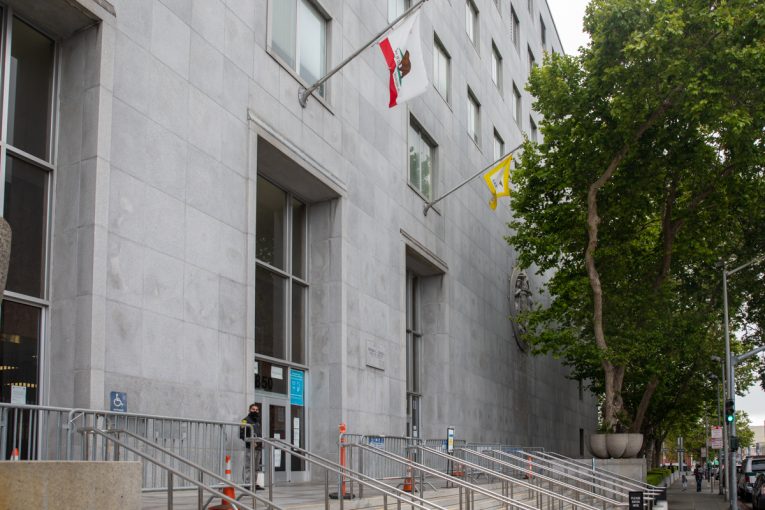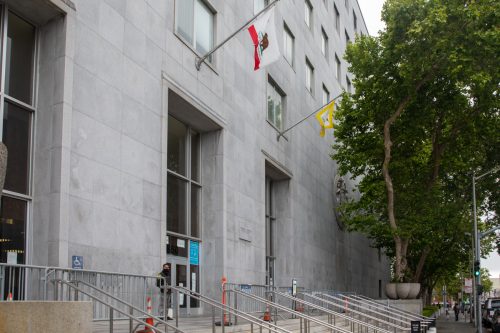

By Jojo Kofman
SAN FRANCISCO, CA – The murder trial proceeded Wednesday in San Francisco County Superior Court for Thomas Ortiz, who allegedly murdered a man outside of a liquor store in the Mission District in 2017.
Deputy District Attorney Dane Reinsedt previously argued the homicide was a gang-related attack that served as vengeance for the death of someone named Rashawn Williams, a 14-year-old who died of a fatal stabbing in 2014.
However, Deputy Public Defender Ali Corea-Levy contested the gang allegations, and argued the shooting was an act of self-defense. He stated that Ortiz and Rashawn Williams were family friends who knew each other since birth, not members of the same gang.
Wednesday’s proceedings contained PD Corea-Levy’s cross-examination of Robert Trujillo, a sergeant of the San Francisco Police department. The PD’s questions were focused on how Trujillo identified Ortiz as affiliated with Army Street Gang.
“Are you aware of problems and biases with gang databases? How people can end up in gang databases when they shouldn’t be there,” asked PD Corea-Levy.
Trujillo responded, “Yes,” and proceeded to explain how the LAPD had issues with people being placed in gang databases who were not gang members. He then admitted that people living in certain neighborhoods are placed in gang data based solely because of their neighborhood.
PD Corea-Levy confirmed that Trujillo had previously said gang members will follow rivals on Instagram, and asked, “Did Ortiz ever follow any rivals on Instagram?” Trujillo said he did not.
“We talked about the significance of tattoos for gangs; does Ortiz have any tattoos whatsoever?” asked PD Corea-Levy. Trujillo responded, “No, at the time of arrest he didn’t.”
PD Corea-Levy went on to explain what Trujillo described as a “sense of clout,” which happens when gang members go into enemy territory and tag something after a violent act. He then asked, “Did you notice any incident where Ortiz tagged anything?” Trujillo said, “No.”
When further questioned by PD Corea-Levy, Trujillo disclosed Ortiz was never arrested for anything prior to this shooting.
Then, PD Corea-Levy asked Trujillo about “field interview cards.” A field interview card identifies a person as an active member or associate of an active criminal street gang by a reliable source.

“It’s fair to say field interview cards don’t make a distinction between if someone is hanging out with members or is a full-fledged gang member, right?”
Trujillo confirmed this to be true, noting, “There was nothing in the cards that showed Ortiz was a validated member of Army Street Gang.”
PD Corea-Levy then stated Trujillo “has drawn most conclusions about Ortiz based on the individuals he’s been seen with.”
He added, “In the music video which Ortiz is seen in, he was wearing a memorial shirt of Rashawn Williams. Did this go into your investigation of Ortiz being a gang member?” Trujillo responded, “Yes.”
Then PD Corea-Levy asked, “Why would you assume a memorial shirt has any indication of someone being in gang?”
Trujillo answered, “I would say the memorial shirt in combination with the gang signs goes into my opinion.”
Since Trujillo hadn’t answered his question, PD Corea-Levy re-asked, “but why?”
“I do know that Ortiz’s family knew the victim well, but it goes to the fact that the gang signs, individuals known as gang members he was with in the video, make the shirt relevant,” responded Trujillo, admitting he did not know the meaning of the shirt.
He then asked Trujillo, “Does it matter to you that Ortiz grew up in his (Rashawn Williams’) neighborhood?”
The PD had previously confirmed with Trujillo that Ortiz and Rashawn Williams had known each other since birth. He’d also noted that many people had been wearing memorial clothing for Rashawn Williams in the Mission District near the time of his death.
Concluding his response, Trujillo said, “He (Ortiz) had the opportunity to choose whatever shirt to wear in that music video with the other gang members…he chose to wear that one.”





